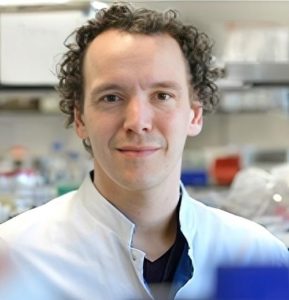Dutch Researchers Investigating Prostate Cancer Discover That a Common Protein Increases Resistance to Therapy in Aggressive Cancer Cells
Study may lead to clinical laboratory involvement in repurposing hormonal treatments to prevent cancer treatment resistance
Diagnosing prostate cancer and identifying which patients have aggressive forms of the cancer has been a challenge. But new insights into how aggressive cancers become resistant to drug therapies—and the discovery of a way to repurpose hormonal treatment to block or slow aggressive prostate cancer—may lead to clinical laboratories monitoring the progress of patients’ being treated with this new type of therapy.
Instead of treating tumors directly, the new approach developed by an international team of scientists would target proteins that typically regulate a cell’s circadian rhythm, but which have been found to be helping cancerous cells become resistant to treatment therapies.
That’s according to a news release from the Antoni van Leeuwenhoek Netherlands Cancer Institute (NKI), Amsterdam, and Oncode Institute, Utrecht, in the Netherlands. The NKI is an oncology-focused hospital and research institute, and Oncode is an independent organization specializing in molecular oncology.
The researchers published their findings in Cancer Discovery, a journal of the American Association for Cancer Research (AACR), titled, “Drug-Induced Epigenomic Plasticity Reprograms Circadian Rhythm Regulation to Drive Prostate Cancer toward Androgen Independence.”

“Our discovery has shown us that we will need to start thinking outside the box when it comes to new drugs to treat prostate cancer and test medicines that affect the circadian clock proteins in order to increase sensitivity to hormonal therapy in prostate cancer,” said Wilbert Zwart, PhD (above), Lead Researcher and Senior Group Leader Oncogenomics Division at NKI, in a news release. This discovery could give clinical laboratories and anatomic pathology groups an effective way to monitor new forms of cancer hormonal treatments. (Photo copyright: Netherlands Cancer Institute.)
Breakthrough Could Mean New Treatment for Aggressive Cancer
The aim of prostate cancer hormone therapy (AKA, androgen suppression therapy) is to halt signals by male hormones (usually testosterone) that stimulate tumor growth. This approach works until cancer becomes resistant to the drug therapy.
So, the challenge in metastatic prostate cancer treatment is finding a drug that prevents resistance to hormonal therapy.
In addressing the challenge, the researchers made a surprising discovery about what exactly dilutes anti-hormonal therapy’s effectiveness. Proteins that regulate the body’s sleep-wake cycle, or circadian rhythm, were found to also “dampen the effects of the anti-hormonal therapy,” according to the study.
“Prostate cancer cells no longer have a circadian rhythm. But these ‘circadian clock’ proteins acquire an entirely new function in the tumor cells upon hormonal therapy: they keep these cancer cells alive, despite treatment. This has never been seen before,” said Wilbert Zwart, PhD, Lead Researcher and Senior Group Leader Oncogenomics Division, NKI, in the news release.
The research suggests treatment for metastatic prostate cancer requires drugs “which influence the day-and-night rhythm of a cell,” and not necessarily medications that fight cancer, Technology Networks noted.
“Fortunately, there are already several therapies that affect circadian proteins, and those can be combined with anti-hormonal therapies. This lead, which allows for a form of drug repurposing, could save a decade of research,” Zwart added.
Questioning Hormonal Therapy Resistance
In their paper, the Dutch researchers acknowledged that androgen receptor (AR)-targeting agents are effective in prostate disease stages. What they wanted to learn was how tumor cells bypass AR suppression.
For the study, the scientists enrolled 56 patients with high-risk prostate cancer in a neoadjuvant clinical trial. Unlike adjuvant therapy, which works to lower the risk that cancer will return following treatment, the purpose of neoadjuvant therapy is to reduce the size of a tumor prior to surgery or radiation therapy, according to the National Institute of Health (NIH) National Cancer Institute (NCI).
The researchers performed DNA analysis of tissue samples from patients who had three months of anti-hormonal therapy before surgery. They observed that “genes keeping tumor cells alive were controlled by a protein that normally regulates the circadian (body) clock,” said Simon Linder, PhD student and researcher at NKI, in the news release.
“We performed integrative multi-omics analyses on tissues isolated before and after three months of AR-targeting enzalutamide monotherapy from patients with high-risk prostate cancer enrolled in a neoadjuvant clinical trial. Transcriptomic analyses demonstrated that AR inhibition drove tumors toward a neuroendocrine-like disease state,” the researchers wrote in Cancer Discovery.
“Understanding how prostate cancers adapt to AR-targeted interventions is critical for identifying novel drug targets to improve the clinical management of treatment-resistant disease. Our study revealed an enzalutamide-induced epigenomic plasticity toward pro-survival signaling and uncovered the circadian regulator ARNTL [Aryl hydrocarbon receptor nuclear translocator-like protein 1] as an acquired vulnerability after AR inhibition, presenting a novel lead for therapeutic development,” the scientists concluded.
More Research Planned
The scientists expressed intent to follow-up with Oncode to develop a drug therapy that would increase anti-hormonal therapy’s effectiveness in prostate cancer patients.
Given the molecular processes involved in the researchers’ discovery, there may be a supportive role for clinical laboratories and anatomic pathology groups in the future. But that can only happen after more studies and a US Food and Drug Administration (FDA) review of any potential new therapy to combat hormonal treatment resistance in prostate cancer patients.
—Donna Marie Pocius
Related Information:
Prostate Cancer Hijacks Tumor Cells Biorhythm to Evade Hormone Therapy
Scientists Make a Prostate Cancer Breakthrough



